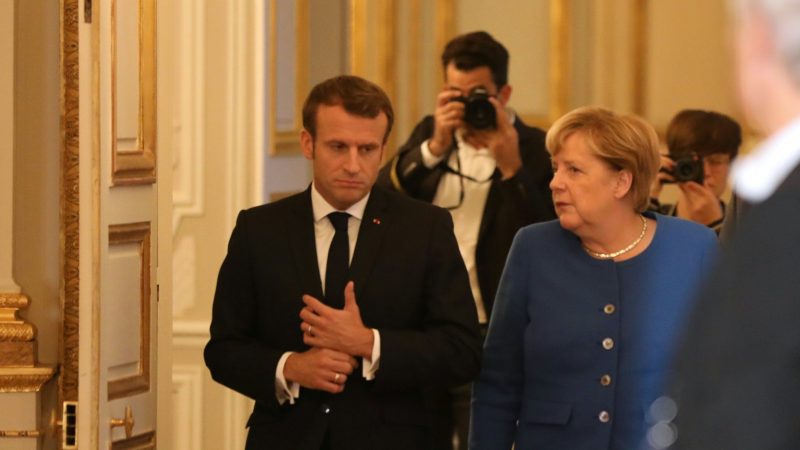The leaders of France and Germany called Sunday (13 October) for an end to Turkey’s offensive against Kurds in northern Syria, warning of dire humanitarian consequences and a boost for the Islamic State group.
Emmanuel Macron hosted Angela Merkel in Paris for a working dinner amid turmoil stirred up by Ankara’s attack and Britain’s pending exit from the European Union, both issues on the leaders’ agenda.
‘Foreign fighters’
The Turkish onslaught in northern Syria has also raised the prospect that Islamic State militants and their families held by the Kurdish forces targeted by Turkey may escape – scores were said to have done so already – and permit the group’s revival.
Western governments fear that the so-called “foreign fighters” would return to Europe and perpetrate terrorist attacks.
Turkey aims to neutralize the Kurdish YPG militia, the main element of Washington’s Kurdish-led ally, the Syrian Democratic Forces (SDF), which has been a key US ally in dismantling the jihadist “caliphate” set up by Islamic State militants in Syria.
Ankara regards the YPG as a terrorist group aligned with Kurdish insurgents in Turkey.
The region’s Kurdish-led administration said 785 Islamic State-affiliated foreigners escaped the camp at Ain Issa but the British-based war monitor Syrian Observatory for Human Rights, citing sources in the camp, said around 100 people had escaped.
Macron told reporters the pair had spoken separately Sunday with US President Donald Trump and Turkey’s Recep Tayyip Erdoğan to deliver a single, clear message: “Our common wish is that the offensive must cease.”
“Our conviction… is that this offensive risks, and we see it already on the ground, to create unbearable humanitarian situations on one hand and on the other help IS re-emerge in the region,” he said at a joint press conference with the chancellor.
Merkel said she had spoken to Erdoğan for an hour and told him: “We must put an end to this Turkish invasion.
“There are humanitarian reasons for this,” she said, adding: “We can no longer accept this situation against the Kurds. Another solution must absolutely be found.”
Fighting has engulfed northern Syria since Wednesday when Ankara launched a long-threatened offensive against the Kurdish-led Syrian Democratic Forces (SDF), which it considers “terrorists” linked to insurgents in Turkey.
Trump has been accused of abandoning a loyal ally in the fight against IS after ordering American troops to pull back from the border region.
At least 60 civilians have been killed in raids by Turkey and its proxies — Syrian ex-rebels, according to observers.
The UN says the violence has forced 130,000 people to flee their homes.
Arms sales stopped
France and Germany on Saturday suspended weapons exports to Turkey, amid international condemnation that had already seen Finland, Norway and The Netherlands stopping arms sales to Ankara.
A meeting in Luxembourg Monday of the European Union’s foreign affairs committee will discuss a coordinated European approach to the issue.
Macron has also called a French defence council meeting, involving Prime Minister Edouard Philippe and the ministers of justice, foreign affairs, defence and the interior, for Sunday night.
The French president called for a stronger, more unified Europe in what he described as “difficult and sometimes worrying” times for the continent and the world.
One reason for this is Brexit — Britain’s exit from the European Union by a 31 October deadline with so far no “divorce deal” in place.
“We are about to lose a member and we will see how the discussions, which have advanced this weekend, will be finalised,” said Macron.
“In this context, it is very clear to me that we can allow ourselves neither division nor self-deception nor weakness.”
Rebuff
British Prime Minister Boris Johnson on Sunday played down hopes of a breakthrough in his last-ditch bid to strike an exit deal with Europe.
On Monday, Macron will host European Council President Donald Tusk for a working lunch at the Élysée presidential residence, before heading to Toulouse in the south of France to lead a French-German ministers meeting with Merkel on issues of defence, security, and climate change.
On Wednesday evening, they will meet the EU’s incoming president Ursula von der Leyen, followed on Thursday and Friday by an EU leaders’ summit in Brussels.
One issue likely to come up is the rejection by European MEPs of Sylvie Goulard, Macron’s chosen candidate for the European Commission portfolio of industrial policy, defence spending, high-tech and space — a rebuff considered a major political blow to the French president.
“I believe very deeply that in this moment in particular, Europe cannot allow itself the luxury of vengeance, of small disputes, or to add internal crises to the tensions of the world already affecting us,” he said Sunday.
“Our strength is in our unity.”








































admin in: How the Muslim Brotherhood betrayed Saudi Arabia?
Great article with insight ...
https://www.viagrapascherfr.com/achat-sildenafil-pfizer-tarif/ in: Cross-region cooperation between anti-terrorism agencies needed
Hello there, just became aware of your blog through Google, and found ...